
India Is The Second Biggest Market for OpenAI
OpenAI, the company behind ChatGPT, has taken its biggest step in India yet. It has registered an entity, begun hiring, and announced its first office in New Delhi. The move cements India as OpenAI’s second-largest market, only behind the United States.
This expansion comes alongside cheaper subscription plans, education initiatives, and upcoming events like an Education Summit and Developer Day. With ChatGPT use in India growing fourfold in the past year, OpenAI is betting big on the country’s appetite for AI. But what does it mean for India’s AI ambitions?
Why Delhi, Not Bengaluru?
The choice of New Delhi for India office over tech hubs like Bengaluru, Hyderabad, or Pune is deliberate. Delhi is not India’s tech hub, but it is the seat of power. By planting its flag in the capital, OpenAI is positioning itself close to policymakers, regulators, and ministries that shape the IndiaAI mission. Delhi doesn’t have tech talent as compared to the other cities but it does have influence and access to the government. This underscores a deeper truth: OpenAI’s move is about influence as much as innovation.
Altman’s Vision for India
Sam Altman, OpenAI’s CEO, has framed the expansion as a partnership with India’s AI ambitions. “India has all the ingredients to become a global AI leader,” he said. He also pointed out that ChatGPT adoption in India has grown 4x in a year, making the market too important to ignore.
India government leaders share this optimism. Ashwini Vaishnaw, India’s electronics and IT minister, called India “uniquely positioned to drive the next wave of AI-led transformation.” The government’s openness towards collaboration with OpenAI also raises another question — has India realised that it cannot be a part of the AI race on its own?
IndiaAI Mission: Promise and Gaps
The IndiaAI Mission, backed by a $1.25 billion budget, aims to build a trusted, inclusive AI ecosystem. It includes plans for startup funding, computing infrastructure, and skilling programs.
Yet the ground reality exposes a gap between vision and delivery. This year’s federal budget allocated only $575,000 to set up three AI research centers — a fraction of what is needed. Experts warn that without sustained investment in education and research, India’s mission risks becoming more symbolic than transformative.
Education Push and Talent Pipeline
On the other hand, OpenAI has placed education at the center of its India playbook. It plans an Education Summit and Developer Day, and has announced the OpenAI Academy with MeitY to upskill developers and students.
But experts remain cautious. Without lifting the entire education system — schools, colleges, and vocational training — India risks producing a workforce that consumes AI but does not create it. AI won’t happen with a poorly educated workforce.
Competition in India’s AI Market
OpenAI’s aggressive India push comes amid intensifying competition. Google’s Gemini is offering free student access. Perplexity has tied up with Airtel to provide a ₹17,000 plan free for a year. Dhruv Rathee’s AI Fiesta has launched six premium models at ₹999 per month.
India is now the battleground where global AI giants are racing to lock in users with cheap or free offerings.
Cheaper Plans Tailored for India
To expand access, OpenAI has launched ChatGPT Go at ₹399 per month, its cheapest plan globally. The offering integrates UPI payments and provides 10x more GPT-5 messages. Alongside, Indic GPT-5 brings local language support, and Study Mode mirrors India’s tutoring culture.
These products show how India has become OpenAI’s testing ground for affordability and localization. What succeeds here may well shape its global strategy.
India at a Crossroads: Empowerment or Extraction?
OpenAI’s Delhi office is a symbol of India’s growing importance in the global AI race. Yet it also raises uncomfortable questions. Is India shaping AI innovation, or is it simply providing the market, data, and talent that Big Tech needs?
Unless India demands co-development rights, algorithmic transparency, and intellectual property sharing for India-specific AI models, the country risks becoming a back office for global AI rather than a leader in the field.
With the world’s youngest population and a large pool of tech talent, India has the raw ingredients to lead. But the real test lies in whether the country can anchor its talent, strengthen its education system, and negotiate partnerships on equal terms or not.
OpenAI’s arrival in Delhi may look like a milestone for India’s AI ambitions. But it could just as easily become a reminder that without self-reliance, ambition risks being overshadowed by Big Tech’s strategic playbook.
